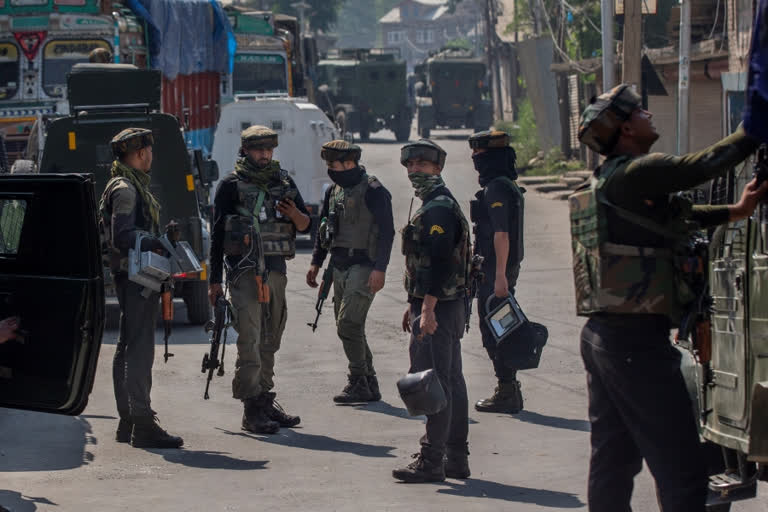Hyderabad:With the US exiting war-torn Afghanistan, India and other neighbouring countries are left with worries and security uncertainties. No doubt that the Taliban allies — China, Pakistan, and Iran — have extended their support to the insurgent group, but cautiously, haven’t recognised the Taliban yet. They too are keenly watching which way the wind blows after withdrawal effects are over. The Taliban allies are waiting for the inclusive government in Afghanistan which the group has promised to make for larger peace in the region.
The US and its allies have been scrambling to get their people out of Afghanistan since the beginning of troops' withdrawal. The Taliban, on the contrary, has stealthily increased the footfall of their cadres in the capital city of Kabul, particularly, after the Kabul airport attack so that they are in the full grip of the situation.
The Taliban 2.0 is apparently different in its conduct than what it appeared in the late 1990s. It was eloquently clear from the Zabihullah Mujahid’s press conference that they have learned to deal with the demon-media. They also have learned the art of perception management that is how they could rub the nose of the West in the dirt by striking with the US the Doha peace deal.
The power of the Taliban has grown steadily following the US withdrawal will not only embolden the other insurgent groups but will provide them with the confidence of negotiating on their terms with the powerful. Most of the countries in the neighbourhood of Afghanistan are facing insurgencies be it China’s Uyghurs, Iran’s ISIS, Pakistan’s TTP, or Kashmir’s secessionism from India. Though the countries have shown their allegiance with the Taliban and at the same time are concerned about the insurgencies back home.
For China, Badakshan province is a headache where ETIM (Eastern Turkistan Islamic Movement) fighters have fought shoulder to shoulder with the Taliban against the US and its allies. ETIM fights for the Uyghur Muslims of the Xinjiang province of China. Badakshan shares around 95 kilometres of border with China’s Xinjiang province. Same way Caucasus Emirates of Chechen fighters is a cause of concern for Russia.
The unbridled Tehreek-e-Taliban has taken Pakistan head-on for more than a decade and has caused considerable human and economic loss. More than the economy, the group has created a huge security concern for ordinary Pakistanis as there have been bomb blasts on public places, even the worship places have not been spared. TTP reportedly have fought with Afghanistan Taliban in their last hours against the northern alliance after the US made deal with the Taliban.
Above all else, it is India that has to be worried the most for they have no close or distant association with the Taliban. The group is in complete control of major insurgent groups operating either on the behest of Pakistan’s ISI or through its military apparatus. There is an overall consensus among the insurgent groups that militants operated in and for Kashmir shall be supported. This consensus has been there for decades. It was established publicly when three militants operating in Kashmir were released in exchange for passengers of hijacked IC 814 Air India flight in 1999 in Kandahar. Afghanistan had Taliban rule when India agreed to release the militants among them was Jaish-e-Mohammad founder Moulana Masood Azhar. Azhar was arrested in Kashmir in the early nineties after he had entered the territory on a Portuguese passport. He has come for mass recruitment of youth into militant ranks as militancy was getting weaker. Armed forces had overpowered militant groups.
Azhar’s release helped militants' regrouping and strategising against India. Unlike other groups — Lashkar and Hizbul Mujahideen — Azhar chose to operate from frontier areas of PoK. Jaish founder and his accomplices could not gain much in the region as India had elected government after years of unrest and the President’s rule in the erstwhile state of Jammu and Kashmir. It was Farooq Abdullah the then chief minister — part of NDA — who opposed the release of three militants — one among them was Masood Azhar — in exchange for passengers. He had even cautioned the then NDA government of costly consequences in the future.
Now the Jaish commander Masood Azhar is negotiating with the Taliban for support to Kashmir insurgency. He went to Kandahar to meet the Taliban leadership immediately after they announced the victory over the US. Azhar is one of the ‘respected’ insurgent commanders before the Taliban. For India, the situation is not the same in Kashmir as it has been in the 1990s. The former elected members of the assembly have lost faith in the Indian leadership after they were sent to jails for opposing the August 2019 decision. Now they speak more of a language of separatists than what they would do earlier for India.
They have become, by default, the proxies of the Hurriyat. They may not believe in what they say but their public posturing is in no way for India anymore. The public outrage after August 2019 can fuel the anger of youth which can be inimical to the overall security scenario if insurgents shift their barrels from war-torn Afghanistan to Kashmir. People like Masood Azhar can again influence the youth of Kashmir. It was Azhar’s Jaish that introduced the fidayeen (suicide) attacks in Kashmir by getting a Srinagar youth ready for the attack on an army base in Srinagar in 2000. That was the beginning of Kashmir’s homegrown fidayeen attacks.
Before Kashmir becomes a hotbed again for insurgents of the Pashtun belt, analysts believe India will have to make a reach-out plan for the Taliban and will have to, simultaneously, gain the lost faith of Kashmir’s leadership. The government will have to have a plan for Kashmir to put an embargo on the viability of insurgency in Kashmir. It depends on the diplomatic acumen of foreign policy experts and negotiators as to how they strike deal with the Taliban to deter them from indulging in Kashmir affairs.
